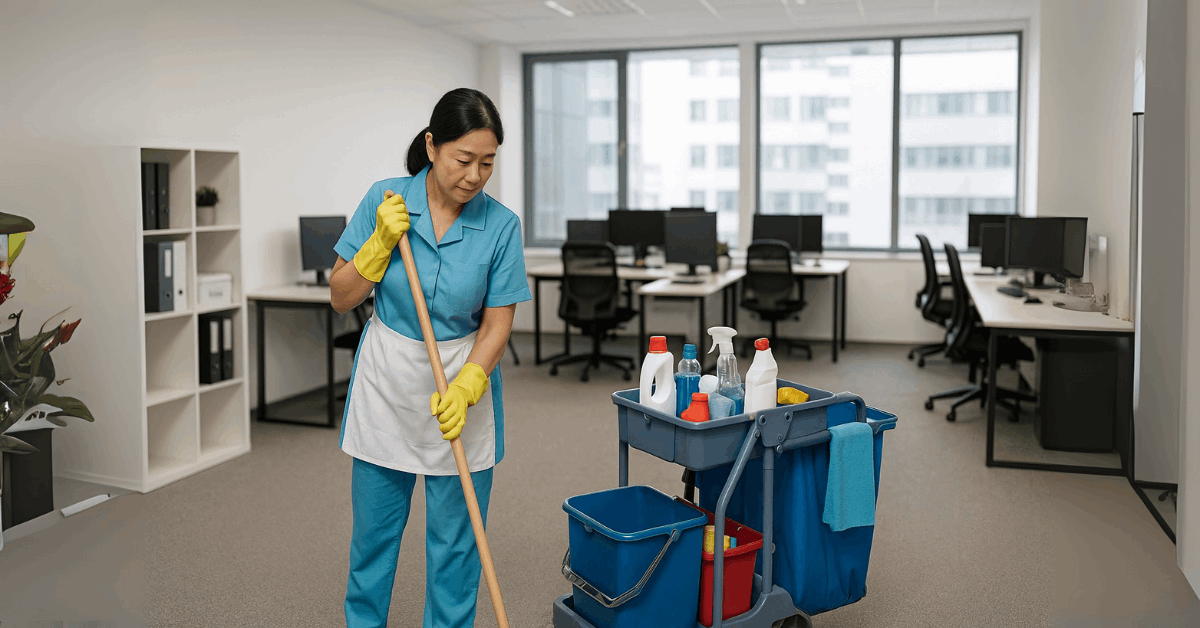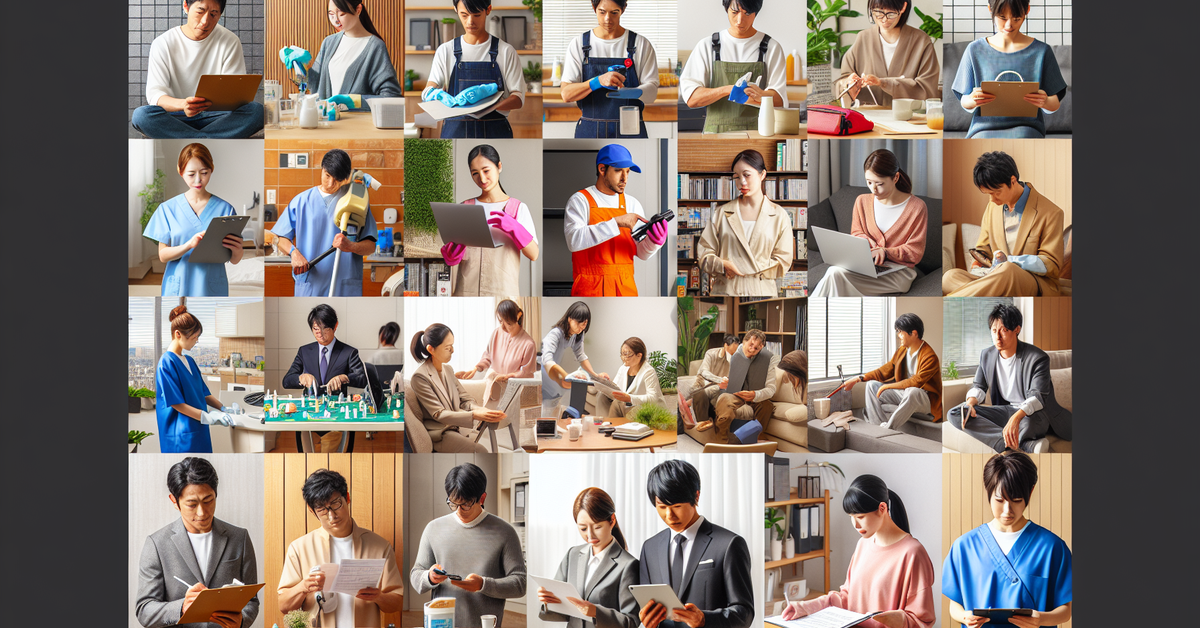Cleaning jobs in Japan can be a realistic entry point for many people looking for steady work, whether they’re already living in the country or planning a move soon.
The demand is ongoing across cities and regions – from family homes to luxury hotels and even bustling train stations. For someone looking for job stability, perhaps with flexible hours and fair conditions, this field deserves your attention.
In this guide, you’ll learn what types of cleaning jobs are available, who can apply, where to find real openings, and how to present yourself confidently in the application process. If you’re weighing your options or just starting your job search, this article is meant for you.
Types of Cleaning Jobs Available in Japan
It’s probably fair to say that when most people picture “cleaning jobs,” they imagine hotel maids or maybe janitors. But in Japan, the cleaning sector is actually quite fragmented, offering a surprising range of opportunities both part-time and full-time. Here are some of the most common roles:

- Residential Cleaning: Working in homes or apartment complexes. Tasks include vacuuming, kitchen surfaces, laundry, and organizing. Some people work independently, some for agencies, and others as part of larger cleaning crews.
- Office & Commercial Cleaning: Cleaning office buildings and commercial spaces, think wiping surfaces, bathrooms, and managing trash. These shifts typically begin very early or much later in the evening, which might suit night owls or those with family commitments.
- Hotel and Hospitality Cleaning: Tidying guest rooms, turning over beds, restocking toiletries, and sanitizing bathrooms. Here, high standards and a knack for working efficiently are must-haves. Most places provide some hands-on training.
- Hospital & Medical Facility Cleaning: Here, strict sanitization is essential. These positions sometimes require prior experience or training, especially regarding how to handle biohazards or medical waste. It’s demanding, but can be rewarding for people who value precision.
- Factory and Warehouse Cleaning: This job is often physical cleaning factory floors, managing industrial waste, and sometimes working around machinery. Shifts may extend late into the night or start quite early, which, again, could be a positive or negative depending on personal preference.
- Public Facility Cleaning: Maintaining cleanliness in places like schools, gyms, or transit stations. The focus is on public spaces, so teamwork and routine become part of the daily rhythm.
Who Can Apply
The short answer is: most people with legal status in Japan, including both Japanese nationals and foreigners, can apply for cleaning jobs. However, it helps to know the details:
- Japanese Citizens and Permanent Residents: No visa restrictions. You can freely apply for any cleaning job listed.
- Foreigners: You’ll need a valid visa, such as a student, spouse, dependent, or certain work visas. Some jobs specify basic Japanese proficiency, though not always fluency.
- Technical Intern Trainees (TITP): Some cleaning jobs are accessible under national internship programs, usually via sending organizations abroad. Paperwork is… well, it can be a little complicated, so guidance helps.
- Specified Skilled Workers (Tokutei Ginou): If you’ve passed relevant skills and language tests, this visa opens the door to cleaning work. The process involves more documentation, but it’s quite direct.
- Applicants from Overseas: You’ll generally need employer sponsorship. Many reliable agencies can help arrange documentation and match you with positions, but be wary of scams (always verify the agency).
Where to Find Cleaning Job Listings
The days of checking bulletin boards at train stations aren’t completely over, but today you’ll discover most jobs online. Here’s where to start your search:

- GaijinPot Jobs – Ideal for English speakers. Filters by visa type and experience.
- YOLO Japan – Tailored to non-Japanese speakers, especially part-time roles. Sign-up required, but listings are updated daily.
- Daijob – Mostly for bilinguals, but includes hospitality and cleaning roles that might require some conversational Japanese.
- Craigslist Tokyo – Occasional gems from smaller employers. Use common sense and always verify offers before accepting or sharing personal info.
- Recruitment Agencies – Agencies like Pasona introduce candidates to reputable employers, help with paperwork, and sometimes even prep you for interviews.
- Hotel Chains & Corporate Career Pages – Many major hotel chains and large companies post cleaning and support roles on their own websites. Applying directly can sometimes speed things up.
For those seeking more flexible or short-term work, also consider checking notice boards at local supermarkets or government job centers (Hello Work), although basic Japanese may be necessary.
How to Apply
The process is not complicated, but a careful approach increases your chances of being hired. Here’s a checklist that, from personal experience and what I’ve heard from friends, covers the essentials:
- Prepare Your Resume (Rirekisho): Use the Japanese format. Attach a recent passport-style photo, include your visa status/type, and note your availability. If you aren’t confident with Japanese, keep your language brief and clear. Many employers appreciate the effort.
- Apply Online or In-Person: For online job boards, create profiles and submit digital documents. Some smaller companies or local agencies might prefer you walk in, bringing print copies can’t hurt.
- Bring Required Documents: Have your residence card ready (for foreigners), plus any necessary permits or proof of visa status. Some jobs may require proof of address.
- Prepare for an Interview (or Trial Shift): Interviews are often short and casual. Occasionally, you might be asked to do a short trial shift, nothing too complicated, just to see if you can follow instructions. Dress neatly, even if the job is manual labor; first impressions matter in Japan, sometimes more than you’d expect.
- Follow Up: If you haven’t heard back within a week, consider calling politely or sending a short email. Persistence shows you’re committed, but don’t go overboard.
Expected Salary and Common Benefits
Let’s be realistic: cleaning jobs in Japan tend to offer relatively modest pay by local standards, but it’s steady and reliable. Salaries can vary by region, shift, and employer.
| Location/Type | Hourly Wage (Typical) | Notes |
|---|---|---|
| Tokyo & Big Cities | ¥1,200–¥1,500 | Late/night shifts may pay extra |
| Other Urban Areas | ¥1,100–¥1,300 | Benefits offered to full-time workers |
| Rural/Small Cities | ¥1,000–¥1,200 | Fewer bonuses, but lower cost of living |
As for benefits, you can usually expect:
- Transportation allowance (commuting expenses covered)
- Uniforms and cleaning supplies provided
- Overtime pay for extra hours
- Some employers offer social/health insurance to full-time staff
- Bonuses (occasionally for long-term employment)
- Stable schedules – predictable shifts, especially for office or hotel positions
While I’ve heard stories of rare extra perks (like free staff meals at hotels), these really depend on the employer.
Work Environment and Typical Expectations
Japanese employers do appreciate punctuality and discipline, sometimes even more than language skills. What should you expect in the workplace?
- Strict cleanliness and punctuality standards: Arriving early and keeping a tidy appearance really is important.
- Routine tasks: Most cleaning jobs have step-by-step instructions; repetition is common.
- Physical labor: Expect extended periods on your feet, some bending and lifting. It’s important not to underestimate the physical aspect.
- Self-motivation: Many roles involve working alone or in pairs, without continuous supervision. Self-discipline is valued.
- Quiet workplaces: Discretion is key, especially in hotels or offices during business hours.
- Basic Japanese language skills help, but as long as you can communicate about tasks, most employers are reasonably flexible, assuming you’re willing to learn a handful of key terms like “souji” (cleaning), “gomibako” (trash bin), or “souji-yohin” (cleaning supplies).
Tip Box: If you have back or knee issues, consider discussing role details before accepting a position. Some cleaning tasks are much more physical than others!
Tips to Improve Your Chances of Getting Hired
Securing a cleaning job in Japan is generally straightforward, but a few preparation steps can really boost your chances:
- Polish your resume (double-check all info, use a neat photo, keep it simple and to the point)
- Learn a few basic Japanese words, such as greetings and job-related vocabulary. Even a little effort gets noticed!
- Apply to multiple employers at once don’t rely on a single opportunity
- Dress neatly for interviews or walk-ins
- Be punctual sometimes arriving a few minutes early is more impressive than a perfect resume
- Show willingness to work various shifts, which is usually a big plus for employers
- Be proactive in following up politely, but don’t pester
Remember, not all employers expect you to speak perfect Japanese. Attitude and reliability often matter more.
Potential Challenges to Be Aware Of
No job is perfect, and cleaning roles can have their downsides. It’s better to be realistic from the outset:
- Physical exhaustion long shifts or repetitive motions can be tough, especially during busy seasons
- Strict standards inspections can be rigorous in hotels, hospitals, or corporate settings
- Language misunderstandings these can occasionally cause confusion about duties or scheduling
- Wages for rural or very small businesses may be at minimum legal levels, and benefits can be limited
- Shift timing early mornings or overnight work might disrupt your daily routine
- Limited long-term advancement without higher Japanese skills or certification
If these factors give you pause, it might be worth exploring related roles (such as facility management, bilingual supervisor, or guest services). Everyone’s priorities are different what’s a drawback to one person could be a bonus for another.
Conclusion: Take Your Next Step
If you’re seeking dependable work, simple entry requirements, and a test of your reliability (with a bit of physical stamina), cleaning jobs in Japan offer a solid, practical foundation. It may not be glamorous, but it’s honest work, and for many, a valuable foot in the door.
Ready to find your opportunity? Start by browsing GaijinPot Jobs or YOLO Japan, prepare a tidy rirekisho, and send a few applications today.
Good luck and remember, sometimes small steps can lead to bigger opportunities down the road.
